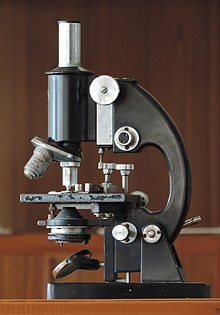Cell biology/What is Cell Biology?
Cell biology is a branch of biology that examines the principles, structure and functions of cells (basic fundamental unit of a living organism), usually on a microscopic or molecular level. The study of cell biology is an essential pillar to medicine and other fields of biology, such as genetics and molecular biology. What is know about cell biology is a culmination of centuries of experimenting and observation. The living cell is a subject that's only been thoroughly accounted for only in recent years.


The concept of the cell was founded by Robert Hooke and Antonie van Leeuwenhoek's efforts in improving the microscope (a fundamental tool in today's science). Hooke caused a shock among the scientific community when he observed pores in a cork under a microscope, to which he described the small spaces in the cork as cells (meaning "compartment") in his book, Micrographia. This is about the 'starting' point of cell biology.
Centuries later, scientists Matthias Schleiden and Theodor Schwann dwelled further into this by studying the cells of animals and plants (respectively). What they were able to find were vast differences between the two type of cells, such as the shape and organelles present on each cell. Credit is given to these two scientists for creating the cell theory:
- All living organisms are composed of one or more cells
- The cell is the basic unit of life
- Cells come from pre-existing cells
The last point actually comes from scientist Rudolf Virchow in 1855. Schleiden and Schwann were incorrect on their theory of "cell formation through crystallization", which was refuted by Virchow and other scientists.
Cell biology can also be divided into many other subjects, such as:
- Study of Cell Metabolism
- Study of Cell Communication
- Study of Cell Cycle
- Study of Biochemistry
- Study of Cell Composition